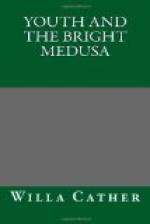The second half of the program consisted of four numbers from the Ring, and closed with Siegfried’s funeral march. My aunt wept quietly, but almost continuously, as a shallow vessel overflows in a rain-storm. From time to time her dim eyes looked up at the lights, burning softly under their dull glass globes.
The deluge of sound poured on and on; I never knew what she found in the shining current of it; I never knew how far it bore her, or past what happy islands. From the trembling of her face I could well believe that before the last number she had been carried out where the myriad graves are, into the grey, nameless burying grounds of the sea; or into some world of death vaster yet, where, from the beginning of the world, hope has lain down with hope and dream with dream and, renouncing, slept.
The concert was over; the people filed out of the hall chattering and laughing, glad to relax and find the living level again, but my kinswoman made no effort to rise. The harpist slipped the green felt cover over his instrument; the flute-players shook the water from their mouthpieces; the men of the orchestra went out one by one, leaving the stage to the chairs and music stands, empty as a winter cornfield.
I spoke to my aunt. She burst into tears and sobbed pleadingly. “I don’t want to go, Clark, I don’t want to go!”
I understood. For her, just outside the concert hall, lay the black pond with the cattle-tracked bluffs; the tall, unpainted house, with weather-curled boards, naked as a tower; the crook-backed ash seedlings where the dish-cloths hung to dry; the gaunt, moulting turkeys picking up refuse about the kitchen door.
The Sculptor’s Funeral
A group of the townspeople stood on the station siding of a little Kansas town, awaiting the coming of the night train, which was already twenty minutes overdue. The snow had fallen thick over everything; in the pale starlight the line of bluffs across the wide, white meadows south of the town made soft, smoke-coloured curves against the clear sky. The men on the siding stood first on one foot and then on the other, their hands thrust deep into their trousers pockets, their overcoats open, their shoulders screwed up with the cold; and they glanced from time to time toward the southeast, where the railroad track wound along the river shore. They conversed in low tones and moved about restlessly, seeming uncertain as to what was expected of them. There was but one of the company who looked as if he knew exactly why he was there, and he kept conspicuously apart; walking to the far end of the platform, returning to the station door, then pacing up the track again, his chin sunk in the high collar of his overcoat, his burly shoulders drooping forward, his gait heavy and dogged. Presently he was approached by a tall, spare, grizzled man clad in a faded Grand Army suit, who shuffled out from the group and advanced with a certain deference, craning his neck forward until his back made the angle of a jack-knife three-quarters open.




